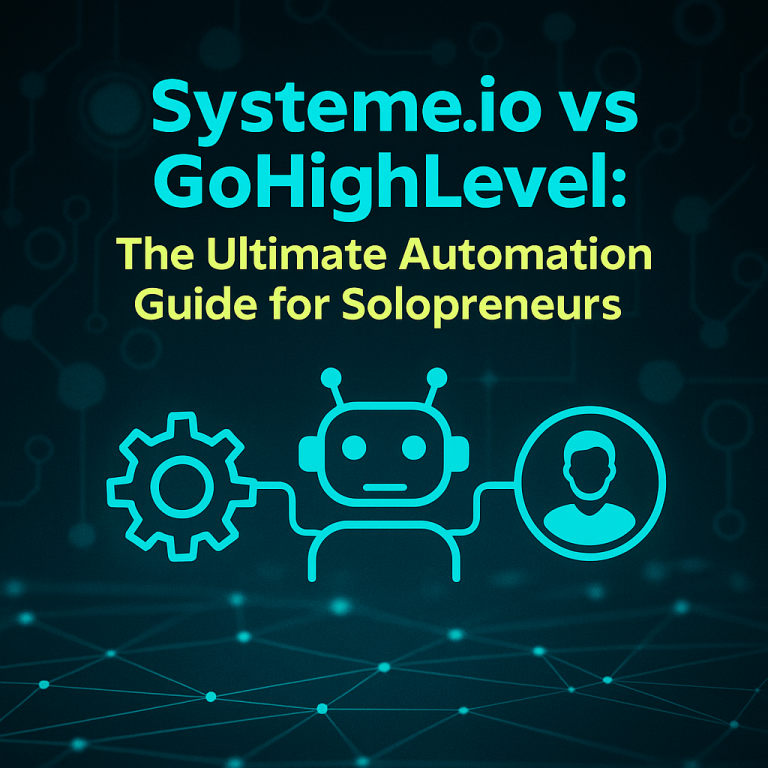Business Automation Plan: Essential Strategies for Solopreneurs to Succeed
—
Business Automation Plan: Essential Strategies for Solopreneurs to Succeed
By CMM
Master your business automation plan with essential strategies and tools designed for solopreneurs to save time, boost productivity, and succeed.
—
Introduction
Creating a solid business automation plan is crucial for solopreneurs who want to maximize efficiency and grow their ventures sustainably. Automation eliminates repetitive tasks, enabling you to focus on strategy and creativity. In this article, you’ll discover essential strategies tailored for solopreneurs ready to transform their business operations.
—
What Is a Business Automation Plan and Why Does It Matter?
A business automation plan outlines the systems and tools that automate repetitive processes such as marketing, sales, and customer service. For solopreneurs, this plan is vital because:
– It saves precious time, freeing you to prioritize growth activities.
– It reduces human error, increasing accuracy and reliability.
– It streamlines workflows for better productivity.
By implementing a thoughtful automation plan, solopreneurs can compete with larger companies without overwhelming themselves.
—
Key Components of a Business Automation Plan for Solopreneurs
To build an effective business automation plan, incorporate these core elements:
1. Customer Relationship Management (CRM):
Automate lead capture and follow-ups with tools like GoHighLevel (nofollow sponsored link). Managing client interactions efficiently boosts conversion rates.
2. Marketing Automation:
Use platforms such as Systeme.io
This post may contain affiliate links. Piscion Global may earn a commission if you purchase through these links—at no extra cost to you. We only recommend tools we've tested and genuinely trust.
or Make to schedule emails, social media posts, and nurture leads without manual work.3. Project and Task Management:
Notion serves as a great all-in-one workspace to keep projects organized and automate reminders.
4. Payment and Invoicing Systems:
Automate billing and payment tracking to get paid faster and reduce administrative burdens.
5. Data and Analytics:
Track performance metrics automatically to make data-driven decisions.
—
Step-by-Step Guide to Create Your Business Automation Plan
Follow these actionable steps to implement a robust automation plan:
Step 1: Identify Repetitive Tasks
List all daily, weekly, and monthly tasks that consume time but add less strategic value.
Step 2: Prioritize High-Impact Areas
Focus first on automating tasks directly related to sales, marketing, and customer engagement.
Step 3: Select the Right Tools
Choose automation platforms that integrate well together. For example:
– Systeme.io This post may contain affiliate links. Piscion Global may earn a commission if you purchase through these links—at no extra cost to you. We only recommend tools we've tested and genuinely trust.
– GoHighLevel: Best for CRM and marketing automation.
– Make: Connects apps and automates workflows easily.
– Sintra: A newer tool that specializes in AI-driven automation.
– Notion: Task and project management with automation features.
Step 4: Design Automation Workflows
Map out workflows such as:
– Lead capture → Email follow-up → Appointment scheduling.
– Purchase confirmation → Invoice generation → Customer feedback request.
Step 5: Test and Optimize
Run pilot automation processes to catch glitches. Use analytics to tweak and improve workflow efficiency.
—
Top Automation Tools for Solopreneurs
Here are detailed insights into must-have automation tools:
– Systeme.io This post may contain affiliate links. Piscion Global may earn a commission if you purchase through these links—at no extra cost to you. We only recommend tools we've tested and genuinely trust.
– GoHighLevel: Excellent for CRM, SMS, and email marketing automation. Helps solopreneurs automate customer nurturing sequences effortlessly.
– Make: Offers powerful app integrations allowing you to automate complex workflows without coding.
– Sintra: Leverages AI to optimize repetitive processes and increase productivity for solo businesses.
– Notion: Beyond note-taking, it offers database-driven task management and automation through templates and integrations.
—
Real-World Example: Automating Client Onboarding
Imagine you are a freelance coach receiving new clients weekly. A business automation plan can streamline onboarding by:
– Automatically sending welcome emails via Systeme.io upon lead capture.
– Scheduling discovery calls through GoHighLevel’s calendar integration.
– Generating contracts and invoices automatically using Make workflows.
– Tracking client progress with Notion dashboards, updated in real-time.
This setup minimizes manual work and improves client experience, empowering you to focus on providing value.
—
Common Pitfalls and How to Avoid Them
Even the best-planned automation strategies can fall short. Watch out for:
– Over-Automation:
Avoid automating every task at once. Start small and scale up.
– Ignoring Personal Touch:
Automation should support—not replace—human connection.
– Choosing Complexity Over Simplicity:
Select user-friendly tools that fit your skill level to prevent frustration.
– Lack of Integration:
Ensure your tools work seamlessly to prevent data silos.
—
How a Business Automation Plan Drives Growth
By automating key processes, solopreneurs can:
– Increase consistency in client communication.
– Save hours on routine tasks each week.
– Access insightful data to refine strategies.
– Scale operations without additional hires.
This creates a sustainable foundation for long-term success.
—
Additional Resources for Solopreneur Automation
To deepen your knowledge, visit the Small Business Administration’s automation guide (dofollow external link). It offers comprehensive tips and best practices for business process automation.
Also, don’t miss our internal post on How to Use Notion for Workflow Automation to get hands-on with smart task management.
—
Conclusion
Designing and implementing a business automation plan transforms how solopreneurs manage their daily operations. By leveraging tools like Systeme.io, GoHighLevel, and Notion, you save time, reduce errors, and boost growth potential. Start small, test your workflows, and scale your automation methods to build a thriving solo business.
Ready to build your empire? Explore the Forge Crafted system and unlock your automation potential.
—
This article was crafted for Piscion Global by CMM.


